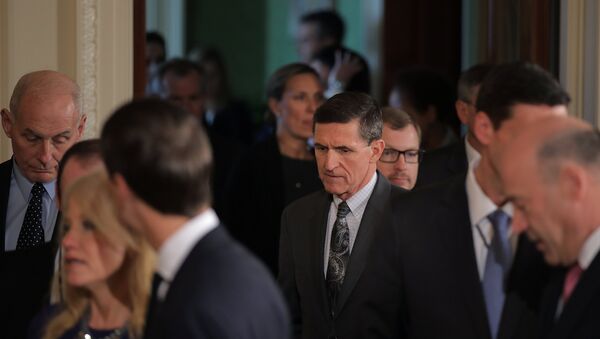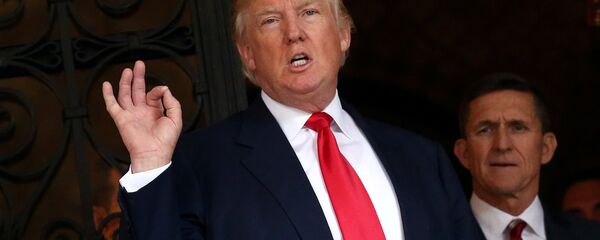As for Flynn's ties with Moscow, the whole story turned out to be "fictitious," the academic pointed out.
Contrary to the expectations of Flynn's "haters," the disclosure of payments for three speeches that he made to Russian companies didn't confirm earlier claims that the Trump team could have had connections with Russia or Russian secret services.
"Fees for public speeches and even for books (which no one reads) are received by many retired American politicians and officials — and they amount not just to tens of thousands of dollars, like Flynn's, but to hundreds of thousands and even millions of dollars," Mirzayan remarked.
The real problem is in Flynn's ties with Turkey, the academic pointed out.
"The Turkish government paid Flynn almost 500 thousand dollars, and not for speeches, but for lobbying services. In particular, for participating in the campaign against Fethullah Gulen — a Turkish preacher living in the US, the enemy of [Turkish President Recep Tayyip] Erdogan," the academic highlighted.
He also called attention to the fact that on November 8, 2016, Flynn published a pro-Turkey editorial in The Hill, a newspaper which focuses on Capitol Hill and US lawmaking, entitled "Our ally Turkey is in crisis and needs our support."
In his op-ed, Flynn criticized the Obama administration for supporting Fethullah Gulen, whom Ankara regards as a mastermind behind the attempted coup in Turkey in July 2016.
"Gulen portrays himself as a moderate, but he is in fact a radical Islamist. He has publicly boasted about his 'soldiers' waiting for his orders to do whatever he directs them to do. If he were in reality a moderate, he would not be in exile, nor would he excite the animus of Recep Tayyip Erdoğan and his government," Flynn argued.
The question arises whether or not Trump's team knew it.
While the White House signaled on March 10 that President Donald Trump didn't know that Flynn had been working as a representative for Turkey, Flynn's attorneys said that they informed Trump's transition team before the inauguration that he might need to register as a foreign agent.
Citing an unclassified Department of Justice (DOJ) document dated January 27, 2017 Ross wrote that Flynn was first contacted by the DOJ's National Security Division on November 30, 2016.
"In light of that editorial and reports in the media about potential ties between Lt. Gen. Flynn and others who might be acting on behalf of the government of Turkey, on November 30, NSD (National Security Division) requested additional information from Lt. Gen. Flynn and his firm, Flynn Intel Group Inc.," the unclassified document read, as quoted by Ross.
The journalist specified that Flynn registered as a foreign agent under the Foreign Agent Registration Act (FARA) in early March, 2017.
According to Mirzayan, if Donald Trump really knew that Flynn had been lobbying for Turkey while being his aide, it will give the President's opponents seeking Trump's impeachment yet another "trump card."
In his article for Fortune, Andrew Kent, a professor of law at Fordham University School of Law in New York City, stressed that "the FBI and Department of Justice prosecutors should look very closely at whether Flynn violated FARA or other federal criminal statutes in his work for Turkey."
Meanwhile, facing a dilemma, Flynn sent a request to the Senate Intelligence Committee and the FBI signaling that he would testify on the "Russia investigation" in exchange for immunity. However, citing a senior congressional source, NBC News reported Friday that immunity for Flynn is "not on the table," and that his request was denied.




